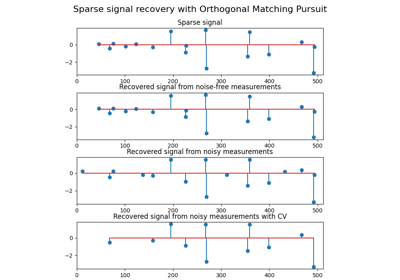sklearn.datasets.make_sparse_coded_signal#
- sklearn.datasets.make_sparse_coded_signal(n_samples, *, n_components, n_features, n_nonzero_coefs, random_state=None, data_transposed='deprecated')[source]#
Generate a signal as a sparse combination of dictionary elements.
Returns a matrix
Y = DX, such thatDis of shape(n_features, n_components),Xis of shape(n_components, n_samples)and each column ofXhas exactlyn_nonzero_coefsnon-zero elements.Read more in the User Guide.
- Parameters:
- n_samplesint
Number of samples to generate.
- n_componentsint
Number of components in the dictionary.
- n_featuresint
Number of features of the dataset to generate.
- n_nonzero_coefsint
Number of active (non-zero) coefficients in each sample.
- random_stateint, RandomState instance or None, default=None
Determines random number generation for dataset creation. Pass an int for reproducible output across multiple function calls. See Glossary.
- data_transposedbool, default=False
By default, Y, D and X are not transposed.
New in version 1.1.
Changed in version 1.3: Default value changed from True to False.
Deprecated since version 1.3:
data_transposedis deprecated and will be removed in 1.5.
- Returns:
- datandarray of shape (n_features, n_samples) or (n_samples, n_features)
The encoded signal (Y). The shape is
(n_samples, n_features)ifdata_transposedis False, otherwise it’s(n_features, n_samples).- dictionaryndarray of shape (n_features, n_components) or (n_components, n_features)
The dictionary with normalized components (D). The shape is
(n_components, n_features)ifdata_transposedis False, otherwise it’s(n_features, n_components).- codendarray of shape (n_components, n_samples) or (n_samples, n_components)
The sparse code such that each column of this matrix has exactly n_nonzero_coefs non-zero items (X). The shape is
(n_samples, n_components)ifdata_transposedis False, otherwise it’s(n_components, n_samples).

